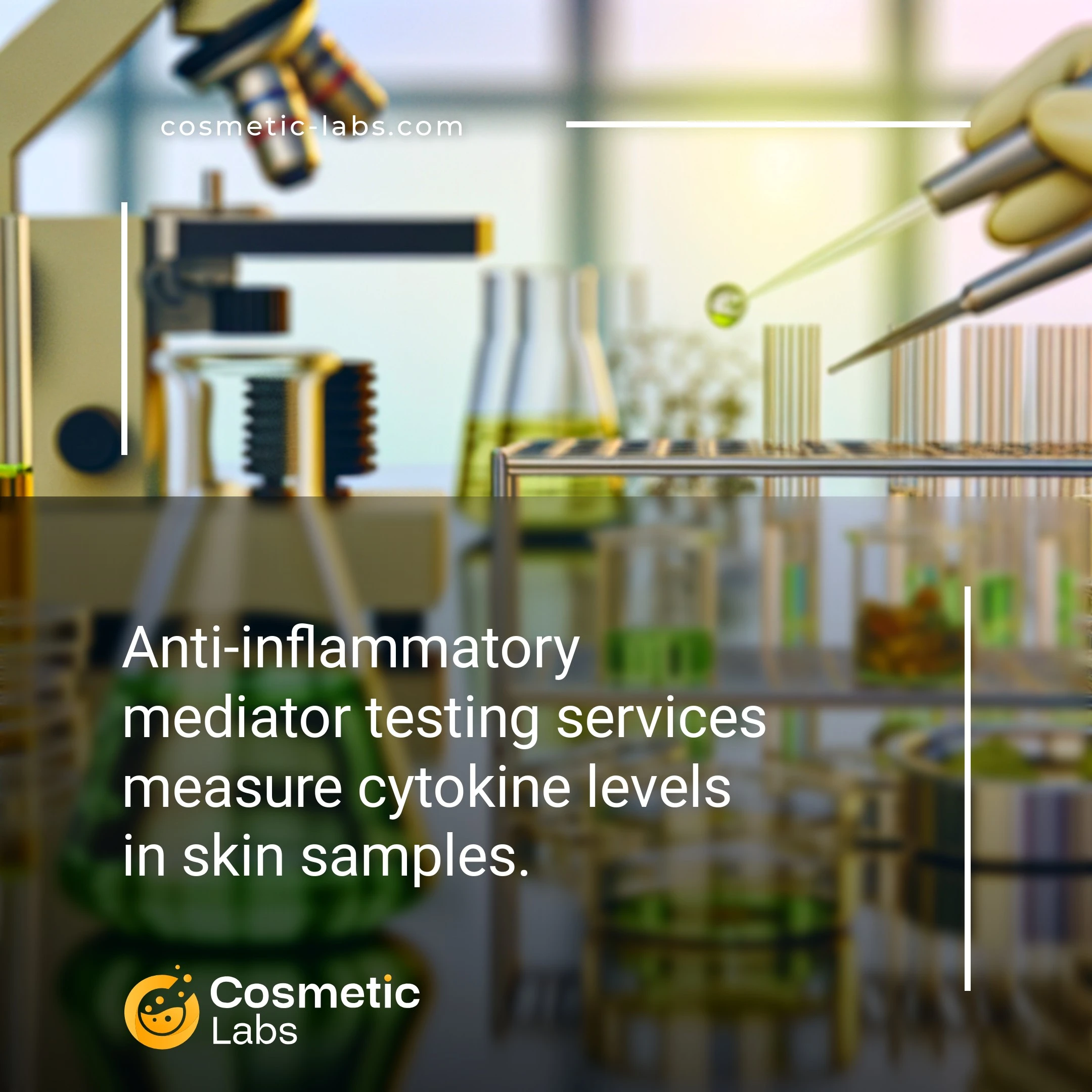Anti-Inflammatory Testing Services for Cosmetic Brands

What is Anti-inflammatory mediators increase testing?
Anti-inflammatory mediator testing services measure how cosmetic ingredients and formulations affect inflammatory pathways in skin cells. Labs use cytokine analysis and biomarker evaluation to quantify reductions in inflammatory responses, helping brands validate claims for sensitive skin products. These preclinical tests identify which compounds like ceramides or niacinamide most effectively calm irritated skin before costly clinical trials.
Why do you need this service?
Cosmetic labs use anti-inflammatory mediator testing to validate soothing claims for sensitive skin products, measuring cytokine reduction and barrier repair responses. Brands developing acne treatments, rosacea serums, and post-procedure skincare rely on these assays to demonstrate clinical-grade efficacy before market launch, ensuring regulatory compliance and consumer trust.
Who provides Anti-inflammatory mediators increase testing services?
All cosmetic labs providing Anti-inflammatory mediators increase testing services
There is no company providing these services at the moment.
Anti-Inflammatory Mediator Testing Services
Cosmetic labs now offer expanded anti-inflammatory mediator testing to help brands validate their skin-soothing claims. These services measure biomarkers like cytokines, prostaglandins, and histamine release to prove your product’s ability to calm irritated skin.
Biomarker Analysis and Cytokine Profiling
Labs test key inflammatory markers including IL-1β, TNF-α, and IL-6 using cell culture models and tissue samples. This data helps you understand exactly how your ingredients work at the molecular level.
Testing options include:
- Real-time PCR for gene expression analysis
- ELISA assays for protein quantification
- Flow cytometry for cellular response measurement
- Multiplex immunoassays for comprehensive profiling
Inflammation Pathway Validation
Partner labs run specialized assays to track how your formulations affect inflammatory cascades. They measure prostaglandin E2 levels, NF-κB activation, and complement system responses using standardized protocols.
These tests provide the scientific backing needed for marketing claims about skin barrier repair and irritation reduction. Results typically include dose-response curves and statistical significance data that regulatory teams require for substantiation.
Connect with specialized testing labs on our platform to discuss your anti-inflammatory validation needs and timeline requirements.
Applications of Anti-Inflammatory Mediator Testing Services
Cosmetic labs use anti-inflammatory mediator testing services to validate product claims and demonstrate ingredient efficacy in reducing skin inflammation markers.
Product Development and Claim Substantiation
Brand owners rely on cytokine profiling and inflammatory biomarker analysis to support marketing claims about soothing, calming, or anti-redness products. Labs measure specific mediators like IL-1β, TNF-α, and prostaglandins using ELISA assays and multiplex immunoassays. This data directly supports claims such as “reduces inflammation by 40% in 24 hours” or “clinically proven to calm irritated skin.”
Testing typically involves in vitro cell culture models using keratinocytes or reconstructed skin tissues exposed to inflammatory triggers. Results provide quantifiable evidence for regulatory submissions and consumer-facing documentation.
Raw Material Screening and Formulation Optimization
Ingredient suppliers and formulators use inflammatory mediator testing to identify the most effective anti-inflammatory compounds before full product development. Labs screen botanical extracts, peptides, and synthetic actives against inflammatory cascades to determine optimal concentrations and combinations.
This approach saves months of development time by eliminating ineffective ingredients early. Testing protocols measure dose-response relationships and identify synergistic combinations that enhance anti-inflammatory activity beyond individual components.
| Testing Method | Mediators Measured | Timeline | Best For |
|---|---|---|---|
| ELISA Assays | IL-1β, TNF-α, IL-6 | 3-5 days | Single mediator quantification |
| Multiplex Immunoassays | 10-40 cytokines simultaneously | 5-7 days | Comprehensive inflammatory profiling |
| Gene Expression Analysis | Inflammatory pathway genes | 7-10 days | Mechanism of action studies |
| Flow Cytometry | Cell surface markers | 2-3 days | Cell activation assessment |
Ready to validate your anti-inflammatory claims with precise mediator testing? Connect with specialized cosmetic labs on our platform to discuss your specific testing requirements and timeline.
